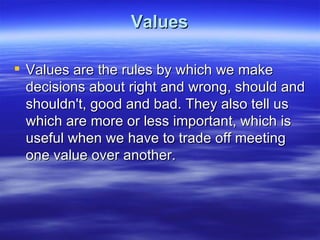Business ethics final
- 1. BUSINESS ETHICS Paper:506 Unit:2
- 2. INTRODUCTION TO BUSINESS ETHICS Business ethics (also known as corporate ethics) is a form of applied ethics or professional ethics that examines ethical principles and moral or ethical problems that arise in a business environment. It applies to all aspects of business conduct and is relevant to the conduct of individuals and entire organizations.
- 3. All businesses have the same essential issues of ethical business conduct namely product quality, transparency of financial statements, workplace quality and safety standards, keeping pace with global environmental issues and compliance with country laws and industry standards. Public’s interest in business ethics increased during the last four decades
- 4. Ethical Issues in Business Employee-Employer Relations Employer-Employee Relations Company-Customer Relations Company-Shareholder Relations Company-Community/Public Interest
- 5. Business Ethics: What Does It Really Mean? Definitions Ethics involves a discipline that examines good or bad practices within the context of a moral duty Moral conduct is behavior that is right or wrong Business ethics include practices and behaviors that are good or bad
- 6. Business Ethics: What Does It Really Mean? Two Key Branches of Ethics Descriptive ethics involves describing, characterizing and studying morality – “What is” Normative ethics involves supplying and justifying moral systems – “What should be”
- 8. Values Values are the rules by which we make decisions about right and wrong, should and shouldn't, good and bad. They also tell us which are more or less important, which is useful when we have to trade off meeting one value over another.
- 9. Morals Morals have a greater social element to values and tend to have a very broad acceptance. Morals are far more about good and bad than other values. We thus judge others more strongly on morals than values. A person can be described as immoral, yet there is no word for them not following values.
- 10. Ethics You can have professional ethics, but you seldom hear about professional morals. Ethics tend to be codified into a formal system or set of rules which are explicitly adopted by a group of people. Thus you have medical ethics. Ethics are thus internally defined and adopted, whilst morals tend to be externally imposed on other people. If you accuse someone of being unethical, it is equivalent of calling them unprofessional and may well be taken as a significant insult and perceived more personally than if you called them immoral (which of course they may also not like).
- 11. "What is wrong is wrong, even if everyone is doing it. Right is still right, even if no one else is doing it."










